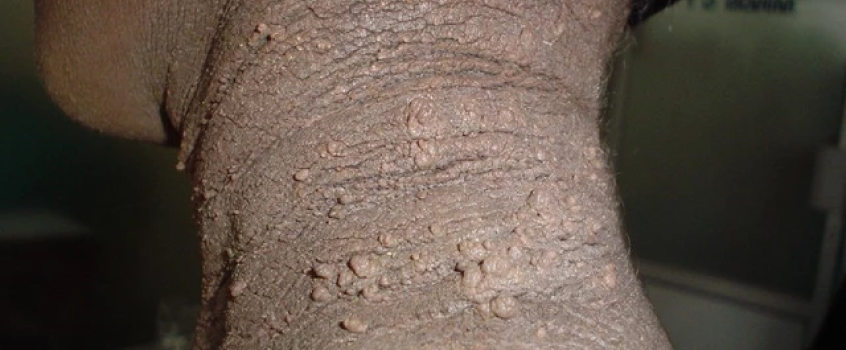Acanthosis Nigricans

Acanthosis Nigricans is a skin condition characterized by dark, thick, velvety patches in body folds, often associated with insulin resistance, obesity, or hormonal disorders.
What is it?
Acanthosis Nigricans is a skin condition characterized by the darkening and thickening of the skin, particularly in body folds such as the neck, armpits, groin, and sometimes the elbows and knees. The affected areas can appear velvety and may also feel rough or dry. Acanthosis Nigricans is not a disease in itself but often indicates an underlying health issue, such as insulin resistance, obesity, hormonal disorders, or even certain cancers.
It is commonly associated with type 2 diabetes, metabolic syndrome, and other conditions related to insulin resistance. In some cases, it can also be linked to the use of certain medications like birth control pills or corticosteroids.
Signs and Symptoms
Dark patches of skin:
The most noticeable symptom is the dark, velvety patches that typically appear in body folds.Thickened skin:
Along with darkening, the skin may become thick and rough to the touch.Itching or discomfort:
Some individuals may experience mild itching or irritation in the affected areas.Skin tags:
Small, benign growths may form in areas where the skin is thickened.
Causes
Insulin Resistance:
The most common cause of Acanthosis Nigricans is insulin resistance. When the body does not respond properly to insulin, higher levels of insulin in the blood can trigger the skin cells to grow abnormally, leading to thickening and darkening.Obesity:
People who are overweight or obese are at a higher risk of developing this condition, as obesity is closely linked to insulin resistance.Hormonal Disorders:
Conditions such as polycystic ovary syndrome (PCOS), thyroid disorders, and Cushing's syndrome can contribute to Acanthosis Nigricans.Medications:
Certain drugs, particularly those affecting hormones or metabolism, like birth control pills, corticosteroids, or high-dose niacin, may cause this condition.Cancer:
In rare cases, Acanthosis Nigricans can be a warning sign of a cancerous tumor, most commonly gastric adenocarcinoma.
Why One Should Not Take Patent Homeopathic Medicine
When dealing with Acanthosis Nigricans, relying on patent homeopathic medicine may provide general relief but lacks the specificity required for the underlying causes. Since the condition is often linked to serious systemic issues like insulin resistance or hormonal imbalances, taking one-size-fits-all treatments may not address the root cause, leading to delayed improvement.
Patent homeopathic remedies, often designed for surface symptoms, fail to individualize care based on the patient's medical history, lifestyle, and body constitution. To truly correct the underlying issues, a personalized homeopathic approach is crucial to regulating insulin levels, balancing hormones, or addressing weight management. Self-prescribed or over-the-counter treatments can miss these critical aspects, delaying recovery or aggravating other health concerns.
Benefits of Homeopathy in Treating Acanthosis Nigricans
Homeopathic treatment offers a holistic and individualized approach to treating Acanthosis Nigricans by addressing both the skin condition and the underlying causes. Here’s how homeopathy can benefit:
Improved Insulin Sensitivity:
Homeopathic remedies can help the body regulate insulin levels, addressing the root cause of insulin resistance and reducing the skin changes associated with it.Weight Management:
Homeopathic remedies aid in improving metabolism and supporting healthy weight loss, which can prevent the progression of Acanthosis Nigricans.Hormonal Balance:
For individuals suffering from hormonal disorders like PCOS or thyroid problems, homeopathy works to restore balance, helping alleviate skin symptoms.Gentle on the Skin:
Homeopathic remedies offer a non-invasive treatment that promotes natural healing without causing irritation or side effects on sensitive skin.Long-term Healing:
Homeopathy offers long-term results by treating the body as a whole and working towards correcting internal imbalances, reducing the chances of recurrence.
TheHomeoSaga is highly experienced in offering personalized homeopathic consultations for those suffering from Acanthosis Nigricans. By addressing not just the skin condition but also the underlying metabolic and hormonal issues, we ensure that you receive the most effective and lasting treatment for your skin health.
